
Corporations
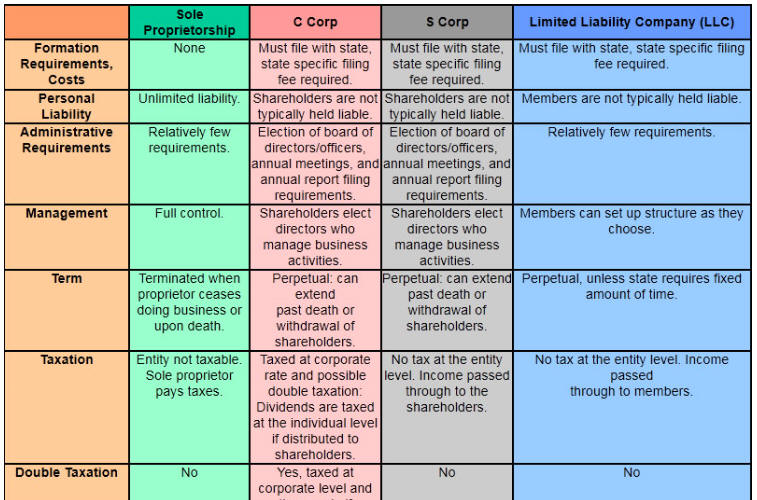
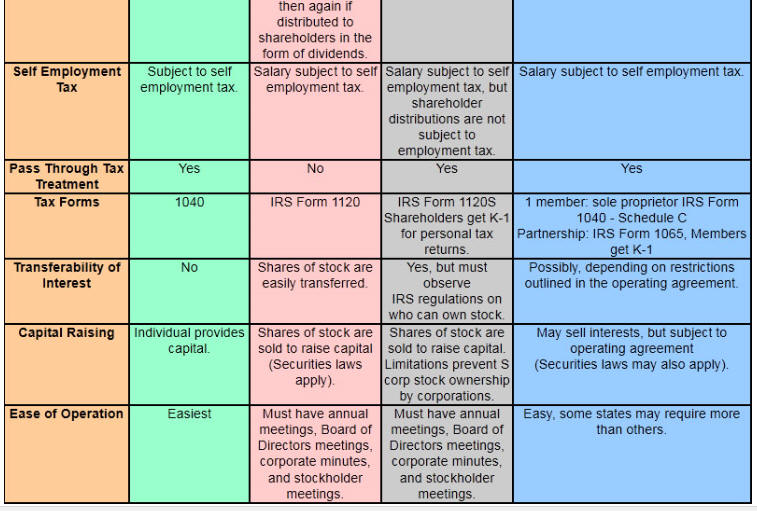
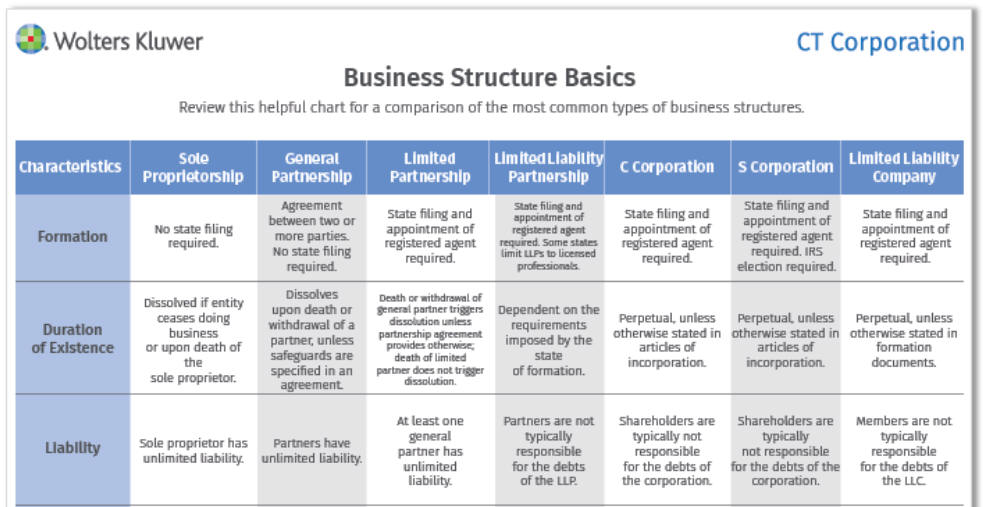
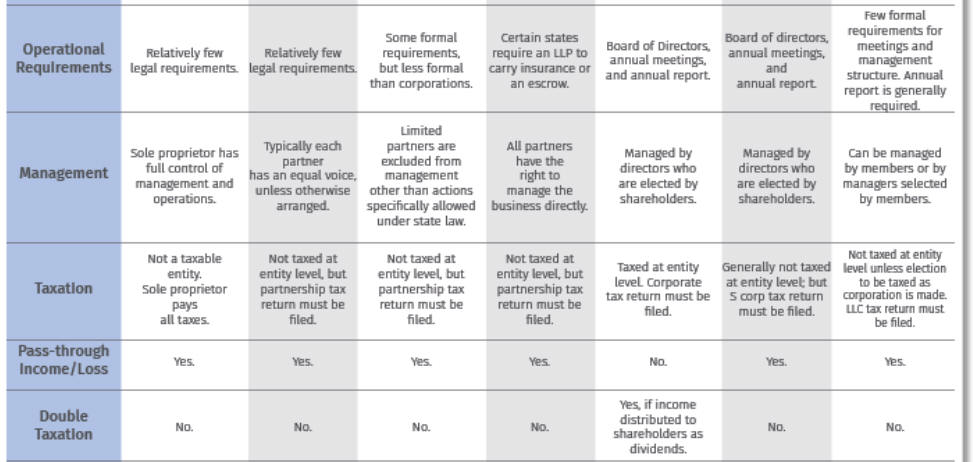

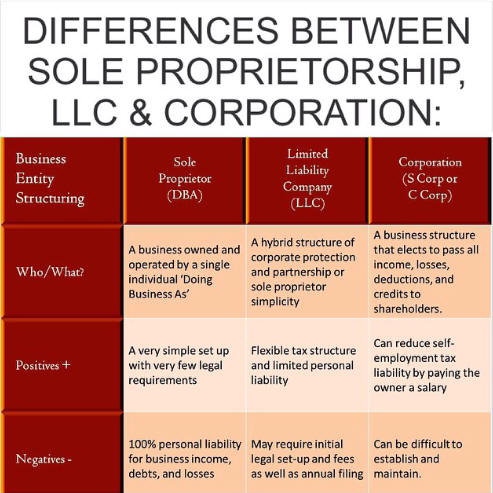
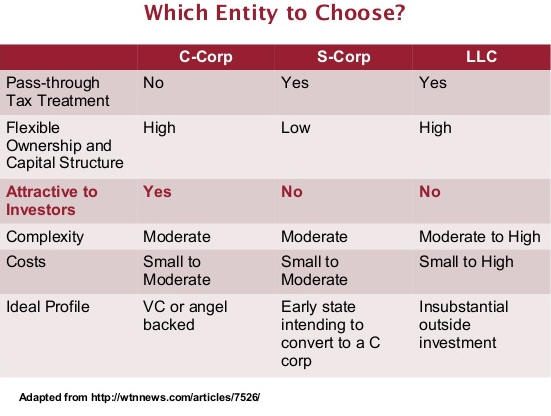





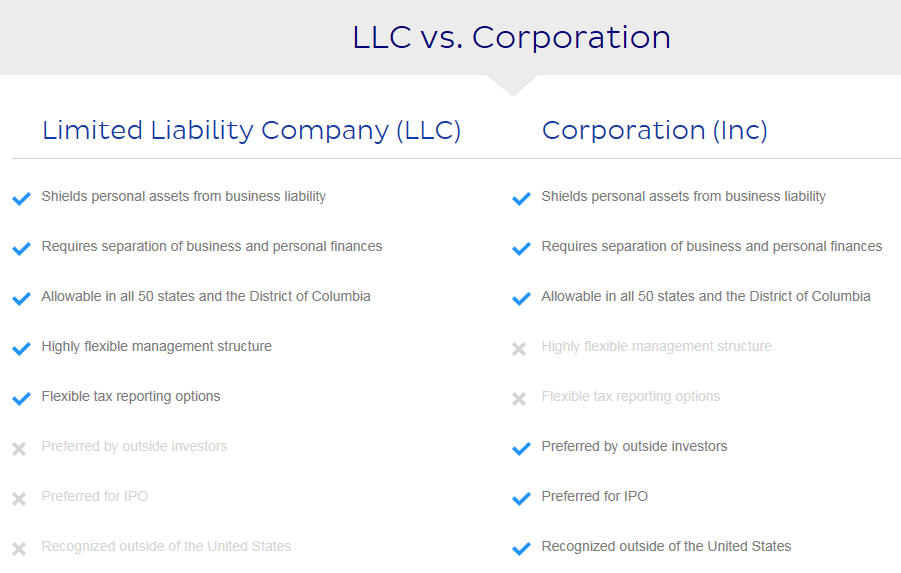
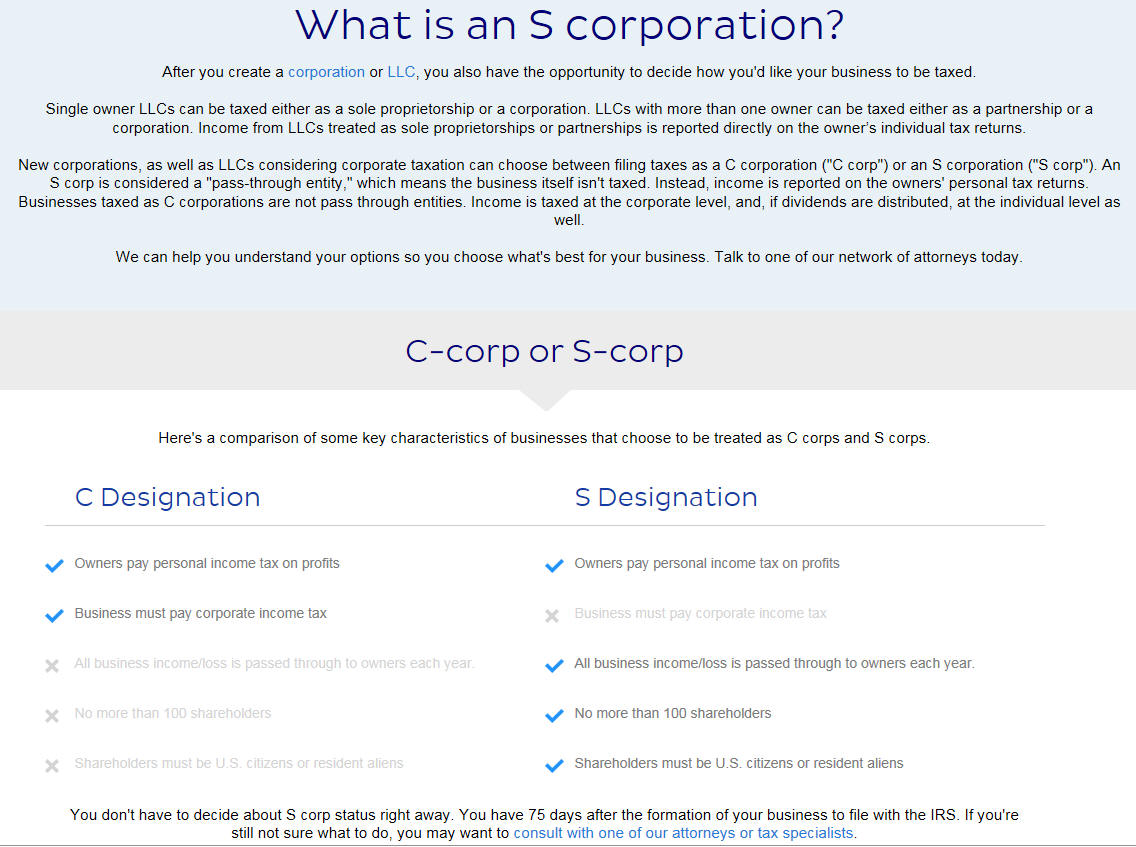
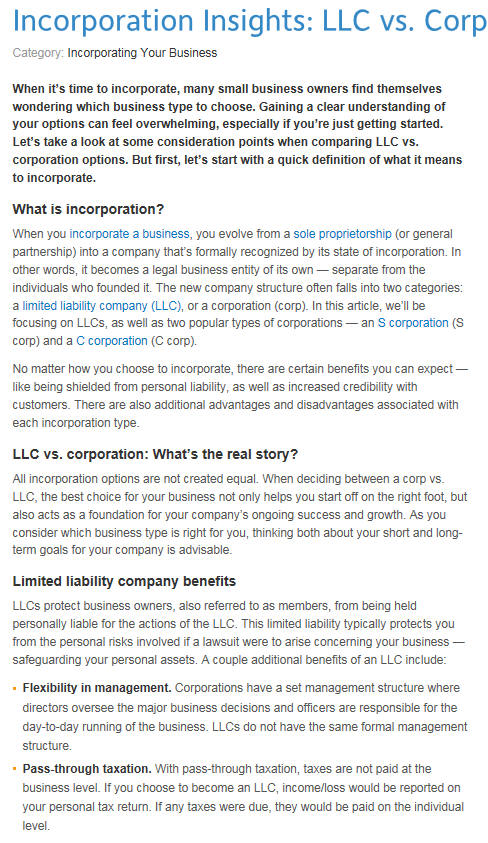
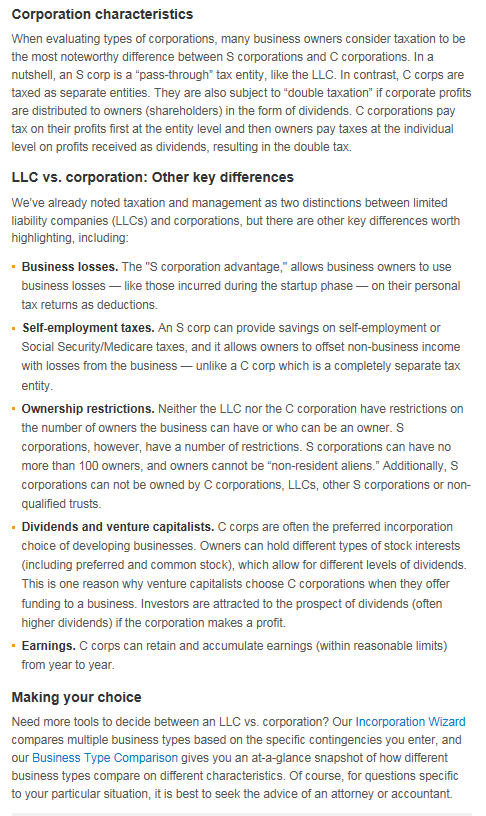
http://www.bizfilings.com/wizard.aspx
http://www.bizfilings.com/comparison.aspx
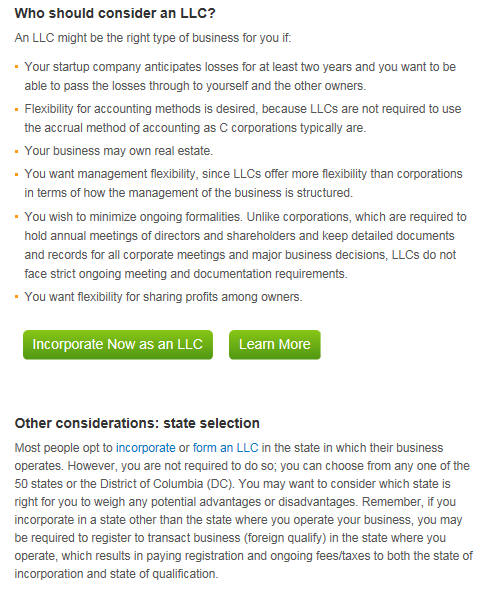
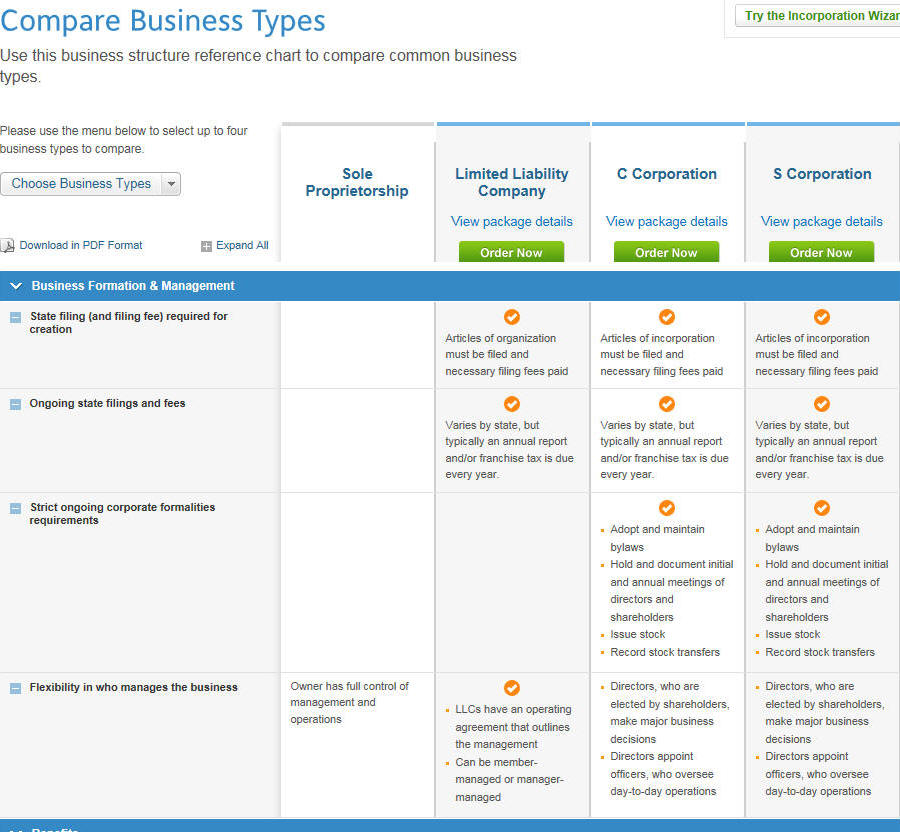

Defining the
Benefits
A major advantage of organizing your business as an LLC or an S corp is that you
can protect your personal assets from the creditors of your business. "Limited
liability means you can't be financially responsible for more than your
investment in the company," writes Greg McFarlane in his book,
Control Your
Cash: Making Money Make Sense.
"If you put in $10,000, and incur $11,000 in debt, you're only potentially
liable for $10,000. Your creditors (check that, your LLC's creditors) can't
'pierce the corporate veil,' as the phrase goes."
Another common aspect of LLCs and S corps is that they help you avoid paying
both personal and corporate taxes. The difference is that in an S corp, owners
pay themselves salaries plus receive dividends from any additional profits the
corporation may earn, while an LLC is a "pass-through entity," which means that
all the income and expenses from the business get reported on the LLC operator's
personal income tax return, says Ebong Eka, a CPA who also pens his own blog
about the world of entrepreneurship at
MoneyMentoringMinutes.com.
Both LLCs and S corps can also deduct pre-tax expenses, such as travel,
uniforms, computers, phone bills, advertising, promotion, gifts, car expenses,
and health care premiums, McFarlane writes.
Dig Deeper:
Choosing Between an LLC and a Corporation
Note the Differences
Once you understand the benefits that come from LLCs and S corps, it's time to
explore some of the pros and cons of each approach. Here are some of the key
differences, according to Eka:
LLC Pros:
The owner of a single member LLC doesn't have to file a tax return for the LLC,
as they only report the activity on their personal tax return.
Ease of setup: Most LLC forms are only a single page for single member LLCs.
Inexpensive to start: The cost of setting up an LLC is also inexpensive, usually
just a couple hundred dollars.
Guidelines: The red tape involved in forming an LLC isn't as stringent as that
involved with S corps, which also leads to savings on accountant and attorney
fees, among others.
LLC Cons:
Self-employment tax: Single member LLC owners are required to pay
self-employment tax on income generated in the LLC, which means making quarterly
estimated payments to the IRS.
Owners of LLCs must make sure they don't pierce the "corporate veil," meaning
they have to operate the LLC separately from their personal affairs. "The LLC
must not be a shell but an operating entity," says Eka. "There have been cases
where a business owner lost their protection because there was no distinct
difference between the LLC and its owner."
Dig Deeper:
What Is an LLC?
S Corp Pros:
The key advantage of an S corp is that it offers tax benefits when it comes to
excess profits, known as distributions. The S corp pays its employees a
"reasonable" salary, which means it should be tied to industry norms, while also
deducting payroll expenses like federal taxes and FICA. Then, any remaining
profits from the company can be distributed to the owners as dividends, which
are taxed at a lower rate than income.
S Corp Cons:
S corps have more strict guidelines than LLCs. Per the tax code, Eka says, you
must meet the following standards to create an S corp:
Must be a U.S. citizen or resident.
Cannot have more than 100 shareholders (a spouse is considered a separate
shareholder for the purpose of this rule).
Corporation can only have one class of stock.
Profits and losses must be distributed to the shareholders in proportion to the
shareholder's interest. For example, you can't have disproportionate
distributions of dividends or losses. If a shareholder owns 10 percent of the S
corp, he or she must receive 10 percent of the profits or losses.
It costs more to form an S corp.
Shareholders must adhere to the requirements at all times. If they don't, they
risk disallowing the S corp election, and the corporation would be treated as a
C corp with its corresponding restrictions.
Passive income limitation: You can't have more than 25 percent of gross receipts
from passive activities, such as real estate investment.
There can be additional state taxes for S corps.
Shareholders should pay attention to paying themselves a "reasonable" salary for
the work they perform for the S corp, since the IRS is increasingly scrutinizing
S corps for this.
Dig Deeper:
What Is an S Corporation?
Case Study: Why an LLC Might Be Best for Your Business
Given that it takes far less red tape to organize and is generally cheaper to
administer, the LLC might be your best choice if you're a new business owner or
operate an internet business, says Eka.
There is also another key benefit of LLCs: You can elect to be taxed as an S
corp while retaining the structure of an LLC. Consider the case of Mike Turner,
founder of Front Street Brokers, a real estate agency in Boise, Idaho. When he
started his business, which sells high-end homes and properties, he was advised
to form it as an LLC, which he did. However, a couple years later, as the
business began to earn more revenue, Turner was shocked by the amount of taxes
he was paying the IRS.
It was then that his accountant told him how he could elect to be taxed like an
S corp while keeping his LLC intact. Turner decided to make the switch. He began
paying himself and his wife a modest salary, which he also pays fees on (such as
FICA and unemployment insurance), and then paying himself a monthly dividend
from the extra profits his company was earning.
"The rules are I must pay myself a realistic salary," says Turner. "I can't pay
myself minimum wage, and do the rest in dividends. But in my industry, the
average salary is not that high, so I can still take a hefty amount via the
dividends." The difference has been a savings of between $6,000 and $8,000 a
year in federal taxes. "I feel I get the best of both worlds," he says. "For my
small business, I get all the legal benefits of running my small business
through an LLC, but I can be taxed as an S corp, which saves me money at tax
time."
Dig Deeper:
Choosing the Limited Liability Company as Your Corporate Form
Case Study: Why an S Corp Might Be the Better Choice
While Turner's story is a compelling one for a smaller, lifestyle business, the
truth is that fast-growing businesses that plan to bring on investors or share
the ownership of the company with employees may need to consider making the
switch to an S corp sooner rather than later.
Consider the case of Vicky Phillips, the founder of
GetEducated.com,
which provides guides and ratings for college courses and programs offered
online. Phillips originally started her business, which is based in Burlington,
Vermont, as an LLC and has kept it that way for 10 years. But now that her
business is established--it now earns $1 million in annual revenue--she's ready
to bring on investors to expand even faster.
In talking to her advisers, she came to realize that it was in her best interest
to convert her company into an S corp, despite some of the disadvantages of
doing so. "There's much more paperwork required to substantiate everything," she
says, since running an S corp requires you to hold meetings, keep minutes, make
resolutions, elect officers, and produce formal financial statements. "But the S
corp structure creates more separation between me and the company, which is
something that investors and bankers are more comfortable with."
Phillips says that she spent about $6,000 on attorney and accountant fees making
the switch over from an LLC, the assets of which were essentially bought by the
new S corp, though she admits she could have spent less if she had been willing
to do more of the paperwork herself. "I'm not a huge fan of more paperwork,
which is one of the key reasons we held off on making the switch for as long as
we did," she says.
__________________________________________________________
Protect Your Ideas – Top Ways To Guard Your Intellectual Property
With the ever-increasing ease in which information can spread, it is becoming
harder to secure your intellectual property or product ideas and ensure they are
not unfairly recreated or produced by someone else. Whether you are a small
start-up or a multinational organisation, taking steps to protect your
intellectual property should be a priority within your business.
What exactly is intellectual property?
The term intellectual property is commonly used, however many people are unsure
of its exact meaning. Put simply, it is any product, idea or work that resulted
from creative thought. Examples include manuscripts, designs, inventions,
business names or confidential information.
If you come up with a great idea, design or product, you want to make sure that
no one else has the right to take that product and claim it as their own.
Intellectual property is protected and governed by various national and
international laws, depending on where the idea was created, what the idea is
and many other determining factors.
Steps to secure your intellectual property
There are a number of key steps you can take to protect your business and its
products and ideas. By following these basic rules suggested by
Prime
Lawyers,
you will be less likely to face issues with intellectual property theft and be
adequately covered should a problem arise.
Register your idea
Contact a patent or intellectual property attorney and register your idea. It is
important that the exact and minute details of your product are written down and
registered to distinguish it from any similar ideas. It is also important to
consider where your product may end up in the future and if there are any
overseas laws or regulations that you need to consider.
Don’t talk about it
Before you have had the chance to adequately secure your intellectual property,
avoiding discussing your idea. Be careful who you trust with this vital
information and do not promote your idea in any sort of public forum. Until you
have officially secured your intellectual property, anyone can take your idea
and create it for themselves.
If you are working in a partnership, it is recommended that you speak with an
attorney and sign non-disclosure agreements.
Record your idea in detail
Ensuring you have detailed drawings, descriptions, plans and general records
that can prove you have been working on your idea will help if anyone challenges
intellectual property ownership. Ensure the information is dated to show when
you were working on the idea.
Apply for a trademark
Once you have a business name and logo for your idea, register an original
trademark. A memorable trademark will help you stand out from any competitors
and can help in promotion of your product in the future. You should also use the
correct copyright symbols on all documentation and development of your product.
This will further enhance your ownership of your idea.
Get a patent
Patents can be purchased to cover a wide variety of physical products ideas and
designs. While they can cost up to $200,000, if your idea is truly
groundbreaking, it can be a very good investment for the future of the product.
Make the investment
Securing your intellectual property rights can be costly and time consuming,
however putting in the effort now may pay off significantly if any issues arise
in the future.